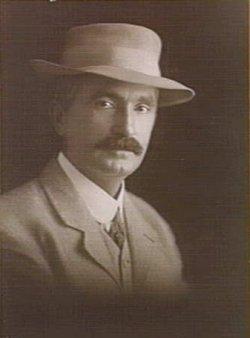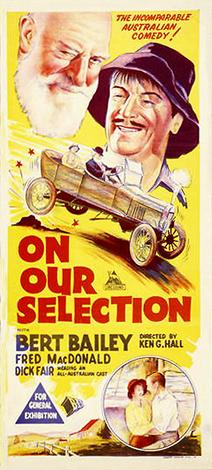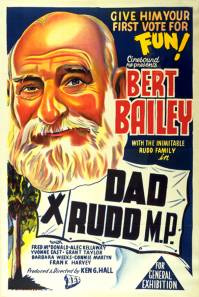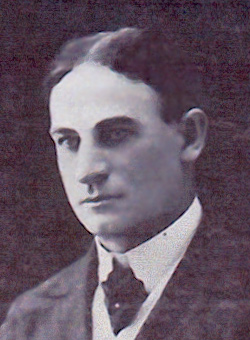Related Research Articles

Steele Rudd was the pen name of Arthur Hoey Davis an Australian author, best known for his short story collection On Our Selection.

Kenneth George Hall was an Australian film producer and director, considered one of the most important figures in the history of the Australian film industry. He was the first Australian to win an Academy Award.
Dad and Dave Come to Town is a 1938 Australian comedy film directed by Ken G. Hall, the third in the 'Dad and Dave' comedy series starring Bert Bailey. It was the feature film debut of Peter Finch and is one of the best known Australian films of the 1930s.
Dad and Dave: On Our Selection is an Australian comedy film, based on the characters and writings of author Steele Rudd. It is set in late nineteenth century colonial Queensland, but largely filmed in Braidwood, New South Wales. The stories of the Rudds have been previously adapted for radio, television, and film. Geoffrey Atherden contributed to the screenplay with George Whaley, the latter of whom directed. This film featured numerous well-known Australian actors, such as Noah Taylor, Ray Barrett, Essie Davis, Murray Bartlett, Celia Ireland, Barry Otto, Nicholas Eadie, and future Oscar-winner Geoffrey Rush as the titular endearingly blundering son, Dave.

On Our Selection is a 1932 comedy based on the Dad and Dave stories by Steele Rudd. These had been turned into a popular play by Bert Bailey and Edmund Duggan in 1912, which formed the basis for the screenplay. Bailey repeats his stage role as Dad Rudd. He also wrote the script with director Ken G. Hall.

Grandad Rudd is a 1935 comedy featuring the Dad and Dave characters created by Steele Rudd and based on a play by Rudd. It was a sequel to On Our Selection, and was later followed by Dad and Dave Come to Town and Dad Rudd, MP.

Dad Rudd, M.P. is a 1940 comedy that was the last of four films made by Ken G. Hall starring Bert Bailey as Dad Rudd. It was the last feature film directed by Hall prior to the war and the last made by Cinesound Productions, Bert Bailey and Frank Harvey.

Albert Edward Bailey, better known as Bert Bailey, was a New Zealand-born Australian playwright, theatrical manager and stage and screen actor best known for playing Dad Rudd, in both mediums, the character from the books penned by Steele Rudd.

Our Friends, the Hayseeds is a 1917 Australian rural comedy from director Beaumont Smith. It centers on the rural family, the Hayseeds, and their rivalry with a neighbouring family, the Duggans.

Edmund Duggan was an Irish-born actor and playwright who worked in Australia. He is best known for writing a number of plays with Bert Bailey including The Squatter's Daughter (1907) and On Our Selection (1912). His solo career was less successful than Bailey's. His sister Eugenie was known as "The Queen of Melodrama" and married noted theatre producer William Anderson, for whom Duggan frequently worked as an actor, writer and stage manager.
The Squatter's Daughter or, The Land of the Wattle is a 1907 Australian play by Bert Bailey and Edmund Duggan, writing under the combined pseudonym Albert Edmunds.
On Our Selection is a 1920 Australian silent film directed by Raymond Longford based on the Dad and Dave stories by Steele Rudd.
Rudd's New Selection is a 1921 Australian silent film directed by Raymond Longford based on the Dad and Dave stories by Steele Rudd. It is a sequel to On Our Selection (1920). The plot concerns the marriage of Dave Rudd and introduces a sister, Nell.
Fred MacDonald (1895–1968), was an Australian actor best known for playing Dave Rudd opposite Bert Bailey on stage and screen, starting with the original 1912 production of On Our Selection. He also played a similar role, Jim Hayseed, several times on screen for director Beaumont Smith.
The Native Born is an Australian play written by Bert Bailey and Edmund Duggan under the name of Albert Edmunds. It was first produced in 1913 by Bailey's own company.
My Mate, or a Bush Love Story is an Australian play by Edmund Duggan which was first produced in 1911.
On Our Selection (1899) is a series of stories written by Australian author Steele Rudd, the pen name of Arthur Hoey Davis, in the late 1890s, featuring the characters Dad and Dave Rudd.
George Whaley was an Australian actor, director and writer, known for his work across theatre and film.

The King's Theatre was a theatre in Melbourne, Australia, located at 133 Russell Street between Bourke Street and Little Collins Street.
McClure and the Parson, or Duncan McClure and the Poor Parson, is a 1916 Australian stage play adapted from the Steele Rudd story Duncan McClure and the Poor Parson. Rudd himself did the adaptation. The play was presented by Bert Bailey who had great success adapting Rudd's On Our Selection.
References
- ↑ ""ON OUR SELECTION."". The Sydney Morning Herald . National Library of Australia. 6 May 1912. p. 4. Retrieved 3 March 2012.
- ↑ "Bert Bailey Started In Melodrama And Made A Fortune From A Beard". The Sunday Herald . Sydney: National Library of Australia. 5 April 1953. p. 12. Retrieved 17 January 2012.
- ↑ ""ON OUR SELECTION."". The Sydney Morning Herald . National Library of Australia. 4 May 1912. p. 18. Retrieved 3 March 2012.
- ↑ Atkinson, Roslyn; Fotheringham, Richard (11 September 2006). "Dramatic Copyright in Australia to 1912" (PDF). University of Queensland. p. 9-10. - originally published in Australasian Drama Studies 11 (1987): 47-63.
- ↑ Papers of Bert and Tim Bailey, National Library of Australia
- ↑ Andrew Pike and Ross Cooper, Australian Film 1900–1977: A Guide to Feature Film Production, Melbourne: Oxford University Press, 1998, page 157
- ↑ Bert Bailey 1868-1953, Live Performance Australia Hall of Fame
- ↑ On Our Selection, Jane Street Theatre, AusStage
- ↑ On Our Selection, Nimrod Upstairs, AusStage
- ↑ "AUSTRALIAN DRAMA". The Age . No. 22, 629. Victoria, Australia. 15 October 1927. p. 28. Retrieved 2 May 2024– via National Library of Australia.